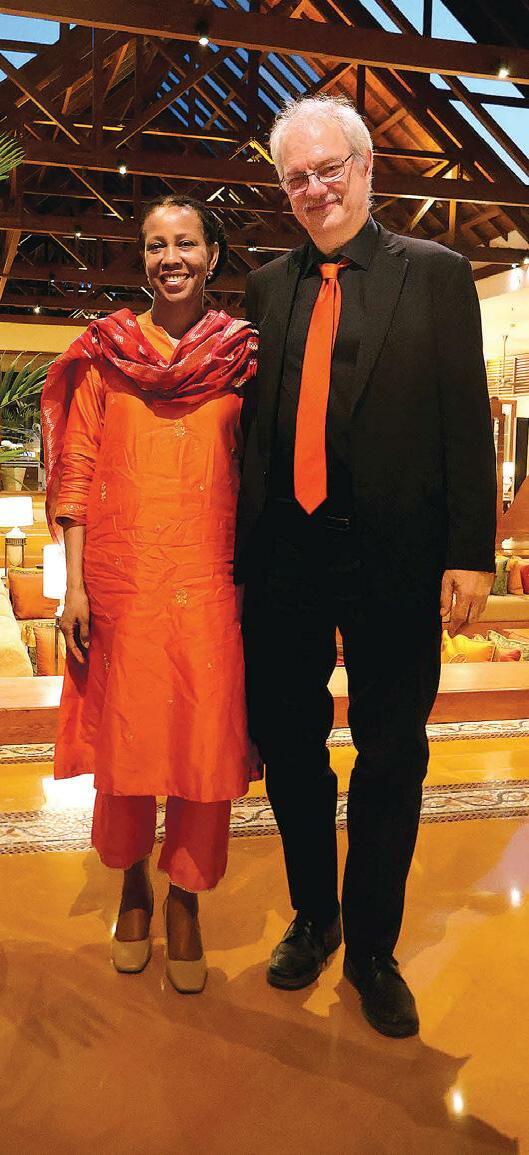
That is Danish scientist Morten Meldal’s oft-repeated statement. His wife, Phaedria Marie St Hilaire, also a distinguished scientist, agrees. Dominican-born Hilaire, founder of the nonprofit The Professional Women of Colour (ProWoc) network, says that “the chemistry of love” between them ‘clicked’ during their shared lab endeavours.
Meldal, along with American chemists K. Barry Sharpless and Carolyn R. Bertozzi, won the Nobel Prize in 2022 for their groundbreaking discovery of 'click chemistry,' a revolutionary method for constructing complex molecules. This innovation holds immense potential to shape our future. But in an exclusive chat with THE WEEK, Meldal, 70, remains humble, characterising it as something simple. Excerpts:
You often mention that your curiosity and early interest in science was instilled by nature, on your grandfather’s farm.
Yes, I have a lot of wonderful memories from my childhood. That’s why I love nature so much, in particular in connection with being in nature. I have very clear images of sitting on a cherry tree, eating the wild cherries and then going to the beach and swimming. I think that childhood should be a happy time where you learn all of these things and get a feeling for what the world is all about.
Your Nobel Prize was for click chemistry. Building complicated molecules is something very important in different domains. Your discovery introduced an efficient and time-saving method to create these complex molecules. What is click chemistry and how has it revolutionised the field?
This story is from the {{IssueName}} edition of {{MagazineName}}.
Start your 7-day Magzter GOLD free trial to access thousands of curated premium stories, and 9,000+ magazines and newspapers.
Already a subscriber ? Sign In
This story is from the {{IssueName}} edition of {{MagazineName}}.
Start your 7-day Magzter GOLD free trial to access thousands of curated premium stories, and 9,000+ magazines and newspapers.
Already a subscriber? Sign In

What Will It Take To Clean Up Delhi Air?
IT IS ASKED, year after year, why Delhi’s air remains unbreathable despite several interventions to reduce pollution.

Trump and the crisis of liberalism
Although Donald Trump's election to a non-consecutive second term to the US presidency is not unprecedented—Grover Cleveland had done it in 1893—it is nevertheless a watershed moment.

Men eye the woman's purse
A couple of months ago, I chanced upon a young 20-something man at my gym walking out with a women’s sling bag.

When trees hold hands
A filmmaker explores the human-nature connect through the living root bridges

Ms Gee & Gen Z
The vibrant Anuja Chauhan and her daughter Nayantara on the generational gap in romance writing

Vikram Seth-a suitable man
Our golden boy of literature was the star attraction at the recent Shillong Literary Festival in mysterious Meghalaya.

Superman bites the dust
When my granddaughter Kim was about three, I often took her to play in a nearby park.

OLD MAN AND THE SEA
Meet G. Govinda Menon, the 102-year-old engineer who had a key role in surveying the Vizhinjam coast in the 1940s, assessing its potential for an international port

Managing volatility: smarter equity choices in uncertain markets
THE INDIAN STOCK MARKET has delivered a strong 11 per cent CAGR over the past decade, with positive returns for eight straight years.

Investing in actively managed low-volatility portfolios keeps risks at bay
AFTER A ROARING bull market over the past year, equity markets in the recent months have gone into a correction mode as FIIs go on a selling spree. Volatility has risen and investment returns are hurt.